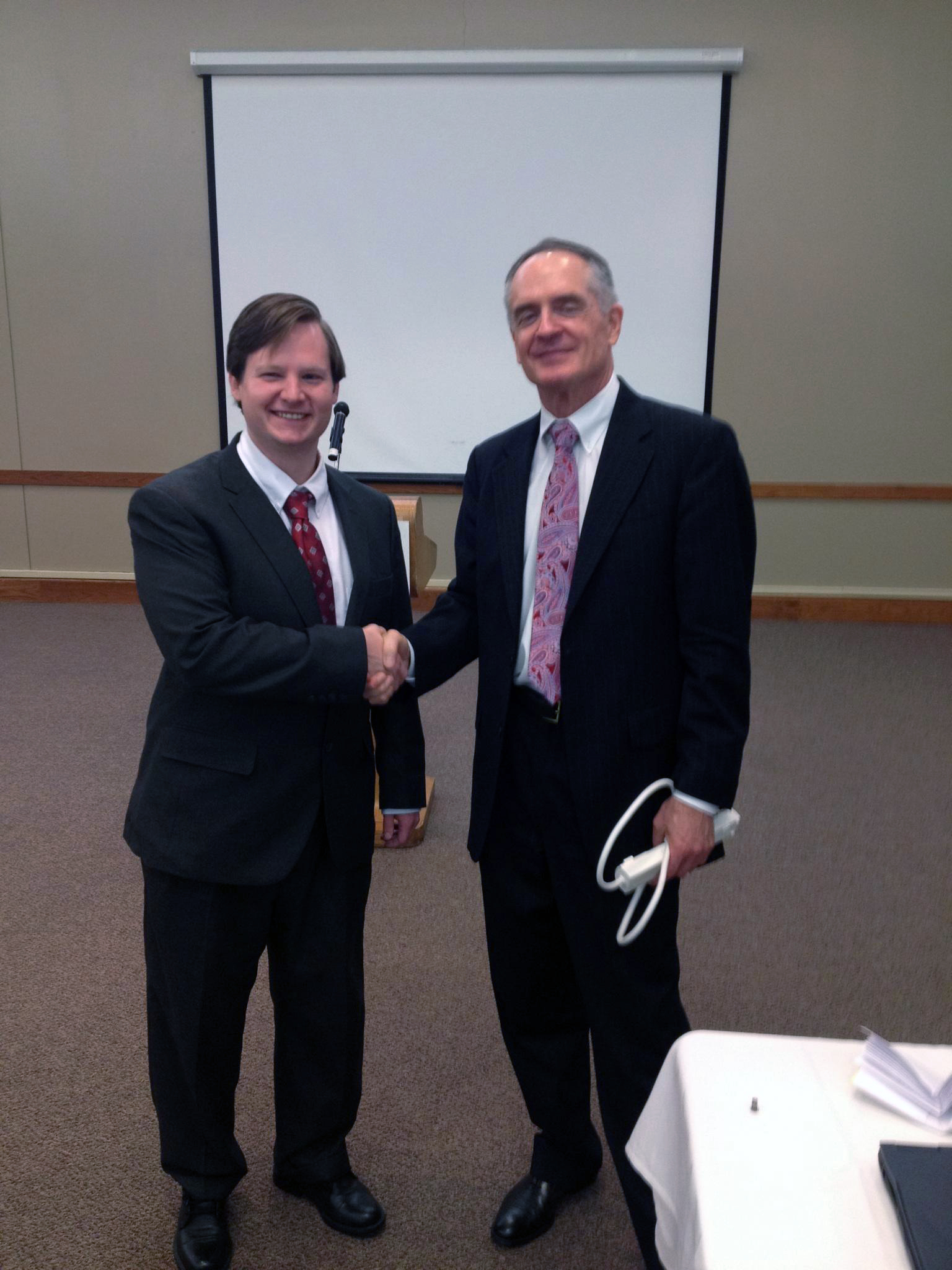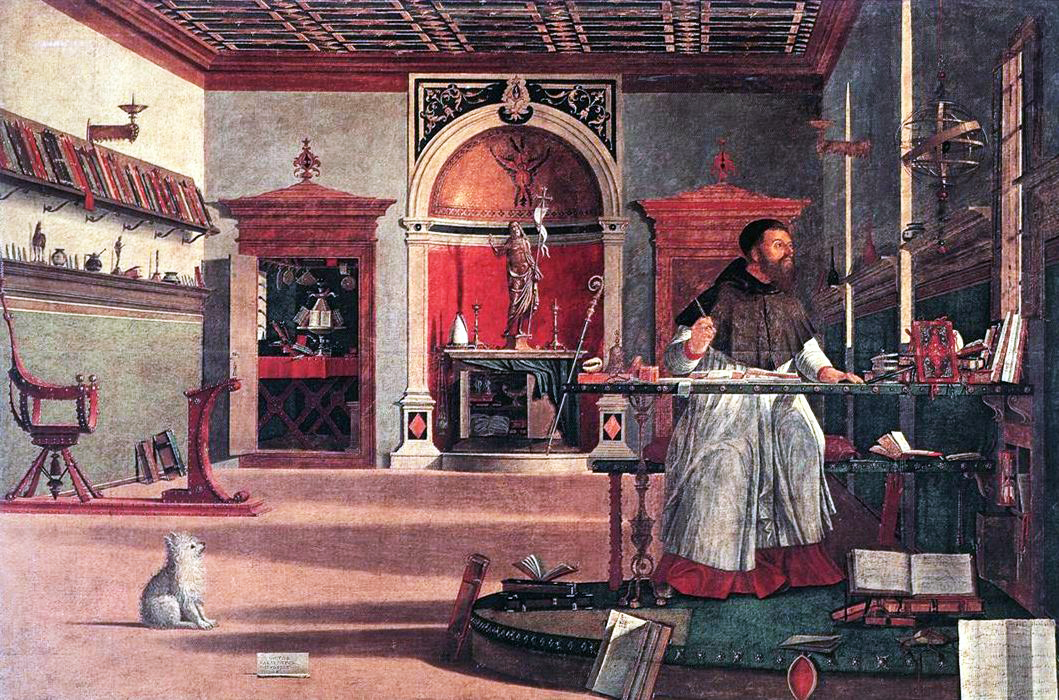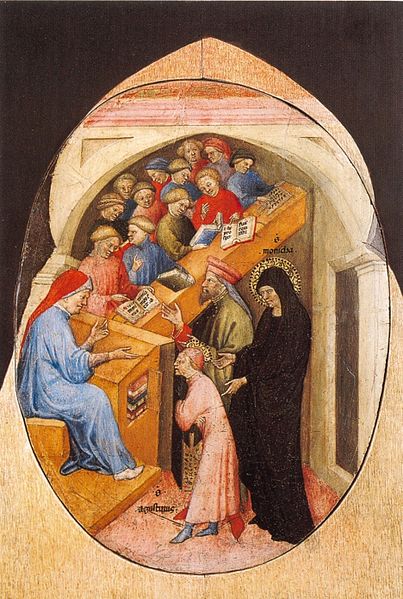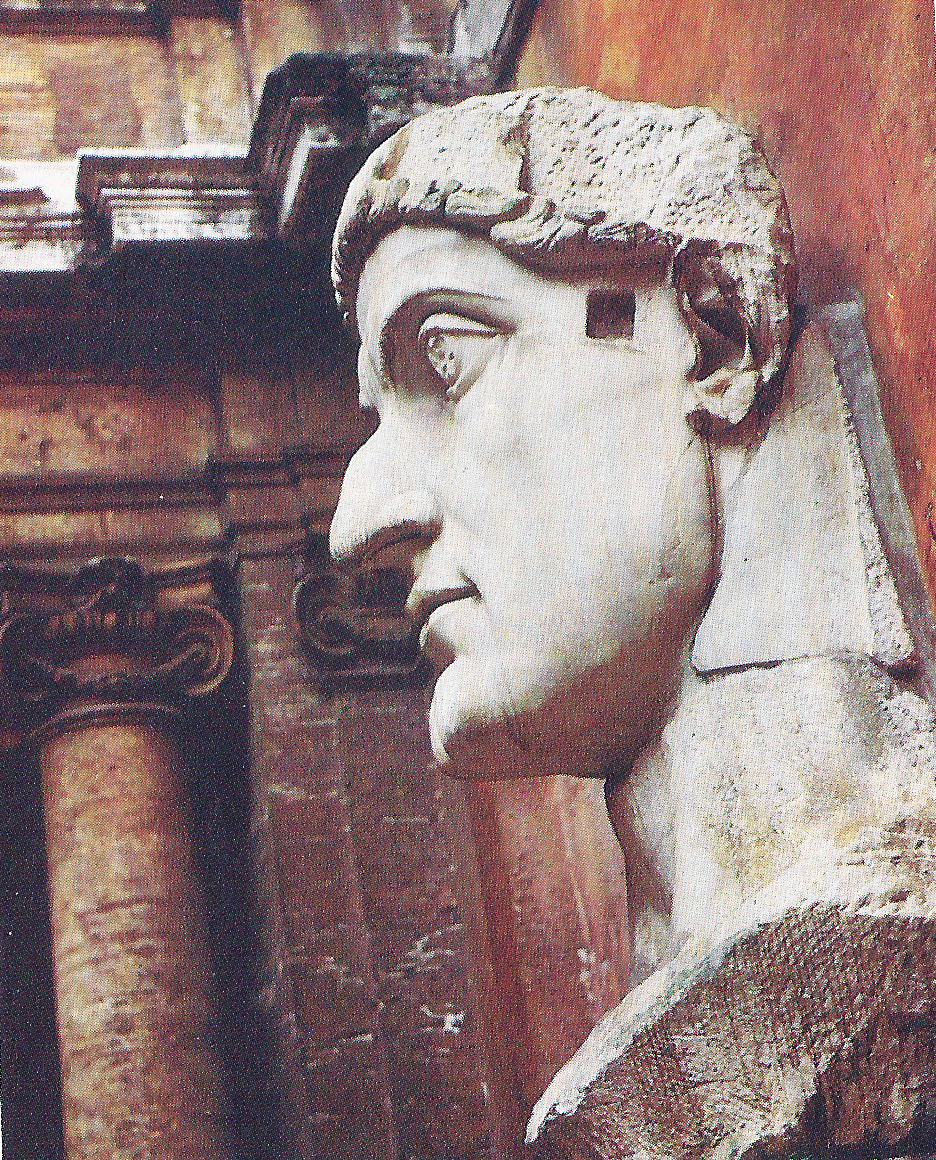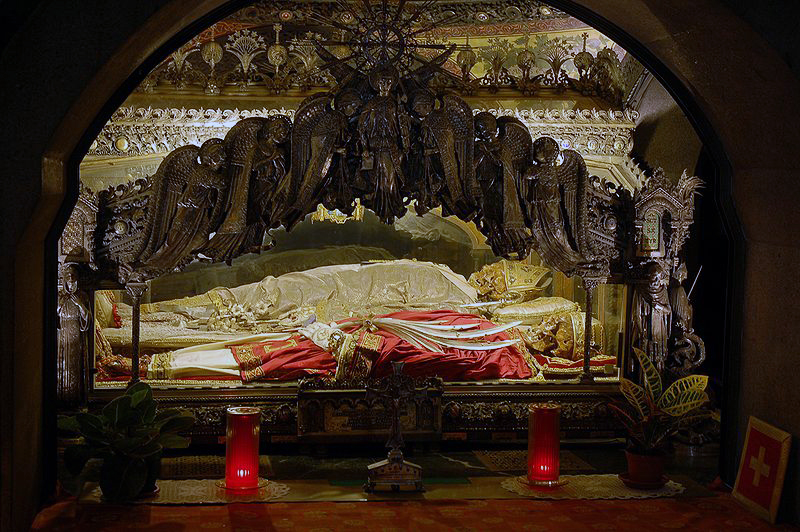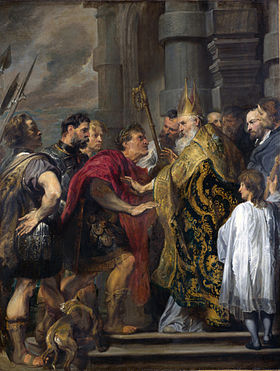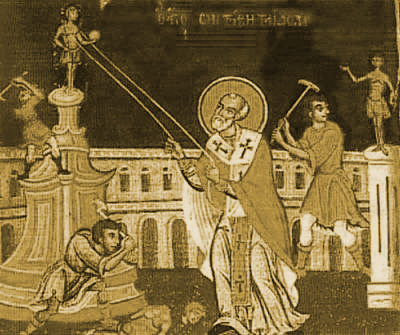Below, an abridged translation from the first volume of Karlheinz Deschner’s Kriminalgeschichte des Christentums (Criminal History of Christianity). For a comprehensive text that explains the absolute need to destroy Judeo-Christianity, see here. In a nutshell, any white person who worships the god of the Jews is, ultimately, ethnosuicidal.
Augustine’s campaign against the Donatists
To the Donatists, whom the African had never mentioned before, he finally paid attention when he was already a priest. Since then he fought them year after year, with greater fury than other ‘heretics’; he threw his contempt to their faces and expelled them from Hippo, their episcopal city. Because the Donatists had committed ‘the crime of schism’ they were nothing but ‘weeds’, animals: ‘these frogs sit in their pond and croak: “we are the only Christians!” but they are heading to hell without knowing it’.
What was a Donatist for Augustine? An alternative that was not presented to him, because, when he was elected bishop, the schism was already 85 years old. It was a local African issue, relatively small, though not divided into ‘countless crumbs’ as he claimed. Catholicism, on the other hand, absorbed the peoples; it had the emperor on his side, the masses, as Augustine blurts out, ‘the unity of the whole world’. Frequently and without hesitation Augustine insists on such demonstration of the majority, incapable of making the reflection that Schiller will later formulate: ‘What is the majority? Most is nonsense; intelligence has always been only in the minority’.
The Donatist was convinced of being a member of a brotherhood. Throughout their tragic history, they collaborated with a religious-revolutionary peasant movement, which inflicted vexations on the landowners: the Circumcellions or Agonistici—temporary workers of the countryside and at the same time the left wing of this Church, who first enjoyed the support of Donatus of Bagai and later that of Gildo.
According to his adversary, Augustine, who characterized them with the psalm of ‘rapids are their feet to shed blood’, they robbed, looted, set fire to the basilicas, threw lime and vinegar in the eyes of Catholics, claimed promissory notes and started with threats his emancipation. Often led by clerics, including bishops, ‘captains of the saints’, these Agonistici or milites Christi (followers of martyrs, hobby pilgrims, terrorists) beat the landowners and Catholic clerics with decks called ‘israels’ under the war cry of ‘Praise be to God’ (laus deo), the ‘trumpets of the massacre’ (Augustine). The Catholics ‘depended to a great extent on the support of the Roman Empire and the landlords, who guaranteed them economic privileges and material protection’ (Reallexikon für Antike und Christentum). It was also not uncommon for the exploited to kill themselves in order to reach paradise. As the Donatists said, because of the persecution they jumped from rocks, as for example the cliffs of Ain Mlila, or to mighty rivers, which for Augustine was not more than ‘a part of their habitual behaviour’.
The centre of their offices was the cult to the martyrs. Excavations carried out in the centre of Algeria, which was the bulwark of the Donatists, have brought to light innumerable chapels dedicated to the adoration of the martyrs and which undoubtedly belonged to the schismatics. Many carried biblical quotes or their currency, Deo laudes.
A Donatist bishop boasted that he had reduced four churches to ashes with his own hand. They, as so often emphasized, even by Augustine, could not be martyrs ‘because they did not live the life of Christ’. The true background of the Donatist problem, which not only led to the religious wars of the years 340, 347 and 361-363 but caused the great uprisings of 372 and 397-398, Augustine failed to understand or did not want to understand. He thought he could explain through a theological discussion what was less a confessional than a social problem: the deep social contrasts within North African Christianity, the abyss between a rich upper class and those who owned nothing; that they were not in any way just the ‘bands of Circumcellions’, but also the slaves and the free masses who hated the dominant ones.
Augustine did not know or did not want to see this. He defended with all tenacity the interests of the possessing and dominant class. For him the Donatists were never right: they simply defamed and lied. He maintained that they were looking for a lie, that their lie ‘fills all Africa’. Initially, Augustine was not in favour of violence. He questioned any attempt to use it. ‘I have no intention of forcing anyone against their will to the religious community with anyone’. Of course, when he learned about the wickedness of the ‘heretics’ and saw that they could be improved with some force, which the Government already commissioned in an increasing way from the year 405, he changed his mind.
The faith of the Donatists, no matter how similar it was—even, essentially, identical—was nothing but error and violence. Catholics, on the other hand, only acted out of pure compassion, out of love. ‘Understand what happens to you! God does not want you to sink into a sacrilegious disunity, separated from your mother, the Catholic Church’.
As the Handbuch der Kirchengeschichte says, or more precisely, the Catholic Baus, ‘here speaks the voice of a man who was so driven and encouraged by the religious responsibility to bring back to an ecclesia the lost brothers in the error, that all the other considerations remained for him in the background’. How typical! He must exonerate Augustine, make his thoughts and actions understandable. Thus, over the course of two millennia, the great crimes of history have been constantly apologised and exalted; they have been glorified. Only in the name of God can they always allow and commit certain crimes, the most atrocious, as will be demonstrated more clearly each time throughout this criminal history.
With an extensive series of astute sentences, without missing those corresponding to the Old and New Testaments, the great lover now demands coercive measures against all those who ‘must be saved’ (corrigendi atque sanandi). The coercion, Augustine teaches now, is sometimes inevitable, because although the best ones can be handled with love, to the majority, unfortunately, it is necessary to force them with fear.
‘He who spares the rod hates his son’ he says, quoting the Bible. ‘A spoiled man is not corrected with words’. And did not Sara chase Hagar? And what did Elijah do with the priests of Baal? For many years Augustine had justified the brutalities of the Old Testament against the Manichaeans, from whom came that book of princes of darkness.
The New Testament could also be used. Did not Paul also give some people to Satan? ‘You know?’, Augustine says to bishop Vixens, explaining the Gospel—:
no one can be forced to justice when you read how the head of the family spoke to his servants: ‘Whoever finds them compels them to enter!’
—which Augustine translates most effectively as ‘force them’ (cogitere intrare). Resistance only demonstrates irrationality. Do not the feverish patients, in their delirium, also revolt against their doctors? Augustine calls tolerance (toleratio) ‘fruitless and vain’ (infructuosa et vana) and is excited by the conversion of many ‘through healthy coercion’ (terrore perculsi). It was nothing else than the program of Firmicus Maternus, ‘the program of a general declaration of war’ (Hoheisel), whether Augustine had read it or not.
‘Under extreme coercion’, the ‘professional speaker’ preaches, rich in tricks, ‘the inner will is realised’, referring to the Acts of the Apostles, 9,4, to John, 6,44, and finally, starting from the year 416-417, to Luke, 14, 23—the Gospel of love! In proceeding against his enemies, he gave the impression that he was also ‘sometimes a little nervous’ (Thomas), although what seemed to be persecution, in reality, was only love, ‘always only love and exclusively love’ (Marrou).
‘The Church presses them against their hearts and surrounds them with motherly tenderness to save them’—through forced labour, fustigations, confiscation of property, elimination of the right of inheritance. However, the only thing that Augustine wants again is to ‘impose’ on the Donatists ‘the advantages of peace, unity and love’:
That is why I have been presented to you as your enemy. You say you want to kill me, although I only tell you the truth and, as far as I’m concerned, I will not let you get lost. God would avenge from you and kill, in you, the error.
God would take revenge on you! The bishop does not consider himself by any means an inciter. But, yes, when it seemed appropriate, he demanded to apply the full weight of the law to the recalcitrant, not granting them ‘grace or forgiveness’. Better said, he authorized torture!
The most famous saint of the ancient Church, perhaps of the whole Church, a ‘so affable person’ (Hendrikx), the father of ‘infinite kindness’ (Grabmann) ‘and generosity ‘(Kotting), who against the Donatists ‘he constantly practiced the sweet behaviour’ (Espenberger), which against them does not formulate ‘any hurtful word’ (Baus), which tries to ‘preserve from the harsh penalties of Roman law’ even ‘the guilty’ (Hümmeler)—in short, the man who becomes spokesman of the mansuetudo catholica, of Catholic benevolence, allows torture…
The thing was not so bad after all! ‘Remember all the possible martyrdoms’, Augustine consoles us:
Compare them with hell and you can imagine everything easily. The torturer and the tortured are here ephemeral, eternal there… We have to fear those pains as we fear God. What the human being suffers here supposes a cure (emendatio) if it is corrected.
Catholics could thus abuse as much as they liked, it was unimportant compared to hell, with that horror that God would impose upon them for all eternity. The earthly torture was ‘light’, ‘transient’, just a ‘cure’!
A theologian is never disconcerted! That’s why he does not know shame either.
In the Christian Empire of those times there prevailed everything except liberality and personal freedom. What prevailed was slavery, children were chained instead of the parents, everywhere there was secret police, ‘and every day could be heard the cries of those whom the court tortured and could be seen the gates with the whimsically executed’ (Chadwick). The emperor’s assassins automatically liquidated the Donatists who had mutilated Catholic priests or who had destroyed churches. Augustine endorsed in practice the death penalty. ‘The greater the hardness with which the State acts, the more Augustine applauds’ (Aland).
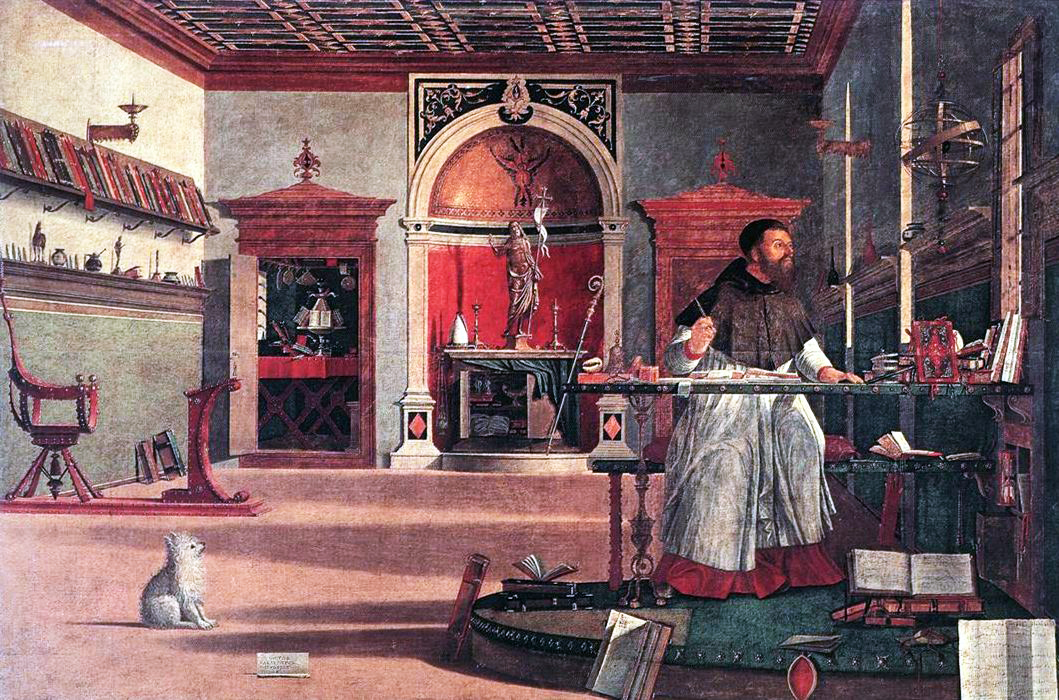 Here we see the celebrated father of the Church in all its magnitude: as a desk author and hypocrite; as a bishop who not only exerted a terrible influence during his life, but who was the initiator of political Augustinism: the archetype of all the bloody inquisitors of so many centuries, of their cruelty, perfidy, prudishness, and a precursor of horror: of the medieval relations between Church and State. Augustine’s example allowed the ‘secular arm’ to throw millions of human beings, including children and the elderly, dying and disabled, to the cells of torture, to the night of the dungeons, to the flames of the fire—and then hypocritically ask the State to respect their lives! All the henchmen and ruffians, princes and monks, bishops and popes who from now on would hunt martyrs and burn ‘heretics’, could lean on Augustine, and in fact they did it; and also the reformers.
Here we see the celebrated father of the Church in all its magnitude: as a desk author and hypocrite; as a bishop who not only exerted a terrible influence during his life, but who was the initiator of political Augustinism: the archetype of all the bloody inquisitors of so many centuries, of their cruelty, perfidy, prudishness, and a precursor of horror: of the medieval relations between Church and State. Augustine’s example allowed the ‘secular arm’ to throw millions of human beings, including children and the elderly, dying and disabled, to the cells of torture, to the night of the dungeons, to the flames of the fire—and then hypocritically ask the State to respect their lives! All the henchmen and ruffians, princes and monks, bishops and popes who from now on would hunt martyrs and burn ‘heretics’, could lean on Augustine, and in fact they did it; and also the reformers.
When in 420 the state minions persecuted the bishop of Ta-mugadi, Gaudentius, he fled to his beautiful basilica; fortified himself there and threatened to burn himself along with his community. The chief of the officials, a pious Christian, who nevertheless persecuted people of his own faith, did not know what party to take and consulted Augustine. The saint, inventor of the sui generis doctrine of predestination, replied:
But since God, according to secret but just will, has predestined some of them to eternal punishment, without a doubt it is better that, although some are lost in their own fire, the vastly greater majority is gathered and recovered from that pernicious division and dispersion, instead of all together be burned in the eternal fire deserved by the sacrilegious division.
Once again Augustine was himself, ‘of course the first theoretician of the Inquisition’, who wrote ‘the only complete justification in the history of the ancient Church’ about ‘the right of the State to repress non-Catholics’ (Brown). In the application of violence, the saint only saw a ‘process of debilitation’, a ‘conversion by oppression’ (per molestias eruditio), a ‘controlled catastrophe’ and compared it to a father ‘who punishes the son who loves’ and that every Saturday night, ‘as a precaution’ beats his family.
The ‘edict of the unit’ of 405 followed other state decrees in the years 407, 408, 409, 412 and 414. The obligatory withdrawal of the Donatists was ordered, their Church was relegated more or less to the underground and they started pogroms that would last several years. The Donatist Church was forbidden; its followers forced to convert to Catholicism. ‘The Lord has shattered the teeth of the lion’ (Augustine). Entire cities, hitherto convinced Donatists, became Catholic out of fear of sorrow and violence, such as the episcopal city of Augustine, where once the ovens could not bake bread for Catholics. Finally, he himself expelled the Donatists. However, when the State tolerated them temporarily during the invasion of Alaric and they returned, for the great saint they seemed ‘wolves to whom it would be necessary to kill with blows’. Only by chance did he escape from an ambush that the Circumcellions had laid out for him.
The masses of slaves and settlers, of whom only their labour force was of any use, were to be maintained within the Catholic Church, through forced labour and the lash of their lords, for the maintenance of ‘Catholic peace’. In the year 414 the Donatists were deprived of all their civil rights and the death penalty was threatened to those who celebrated their religious services. ‘Where there is love, there is peace’ (Augustine). Or as our bishop later declared triumphantly: Quodvult deus de Cartago: the viper has been crushed, or better still: it has been devoured.
After the year 418, the theme of the Donatists disappears for decades from the debates held in the synods of the North African bishops. In 420 it appears the last anti-Donatist writing of Augustine: Contra Gaudentium. In 429, with the invasion of the Vandals, the anti-Donatist imperial edicts also ended, which continued to call for annihilation. However, the schism lasted until the 6th century, although very weakened.
The sad remains that managed to escape the constant persecutions were destroyed a century later, along with Catholics, by Islam. African Christianity was undermined, bankrupt; finally, completely separated from Europe in the religious aspect, and escaped from its area of influence to fall into that of the Near East.
The most important ancient of the Christian churches, the only one in the Mediterranean, disappeared without a trace. There was nothing left of her. ‘But it was not due to Islam but to the persecutions against the Donatists, which made North Africa hate the Catholic Church so much that the Donatists received Islam as a liberation and converted to it’ (Kawerau).
______ 卐 ______
Liked it? Take a second to support The West’s Darkest Hour.


